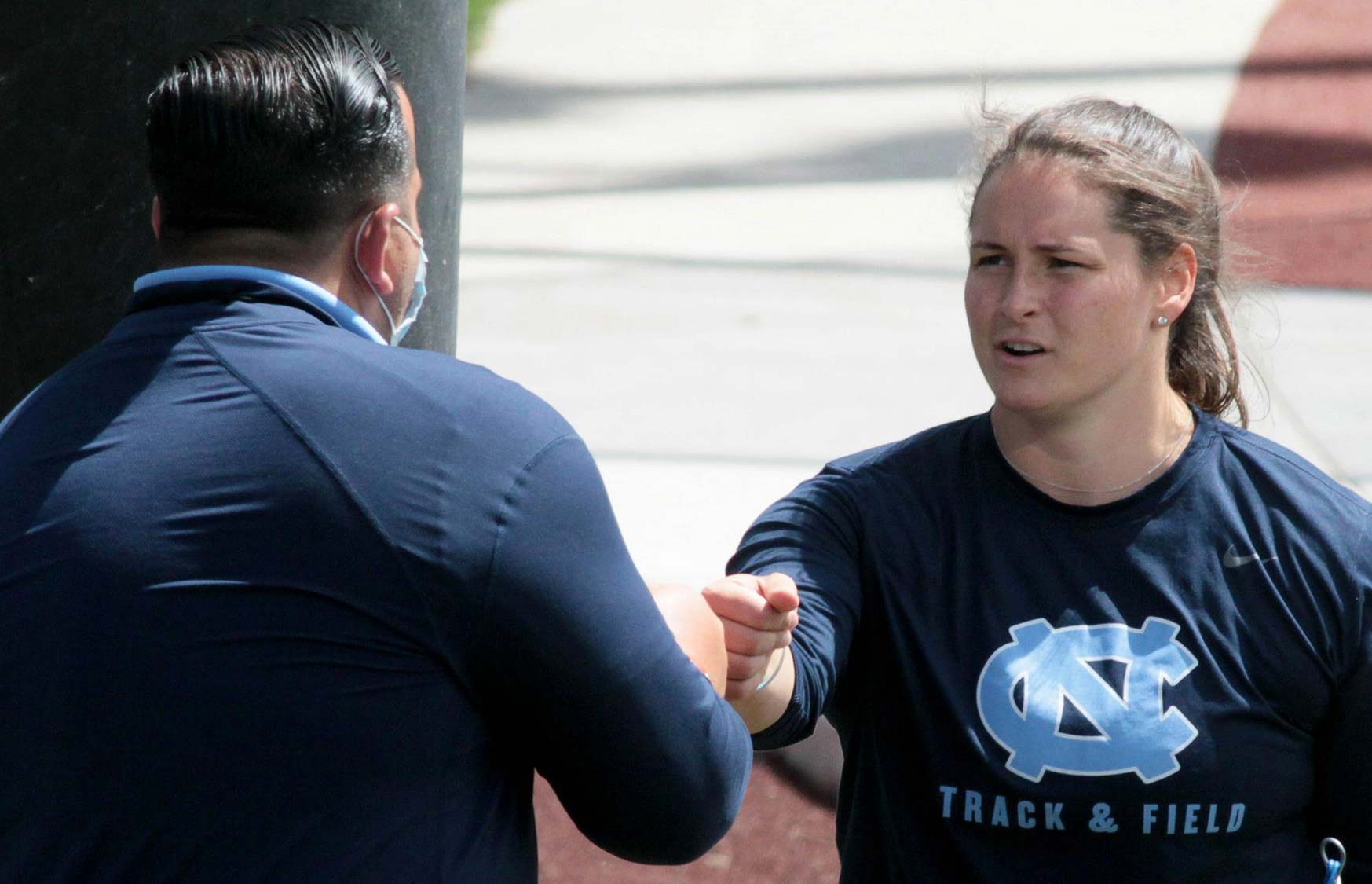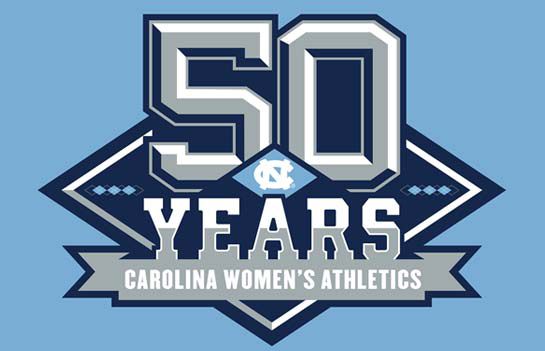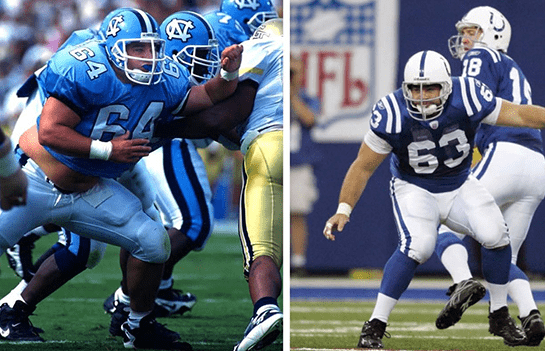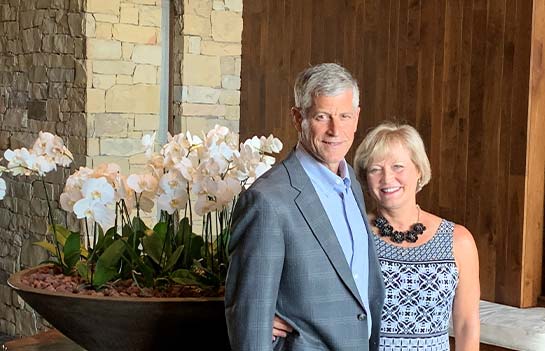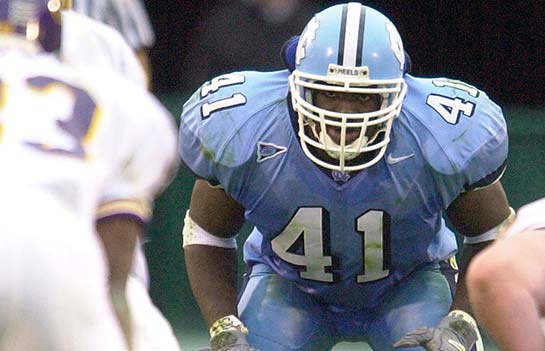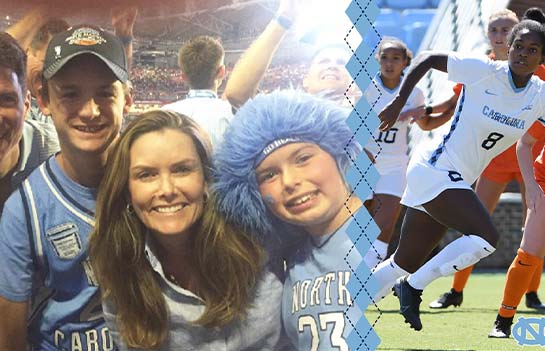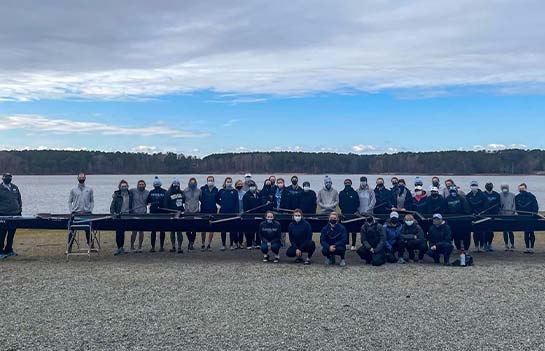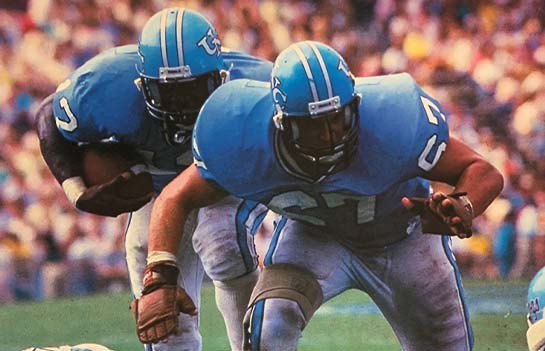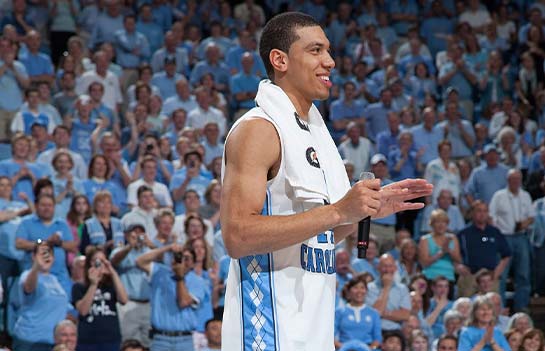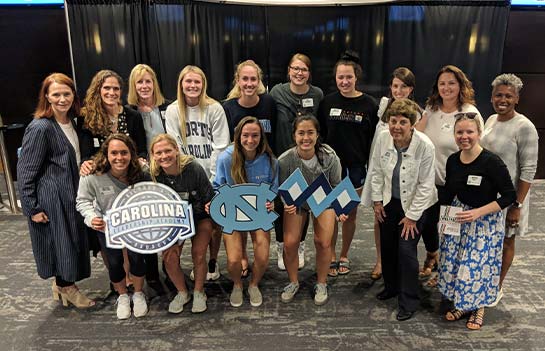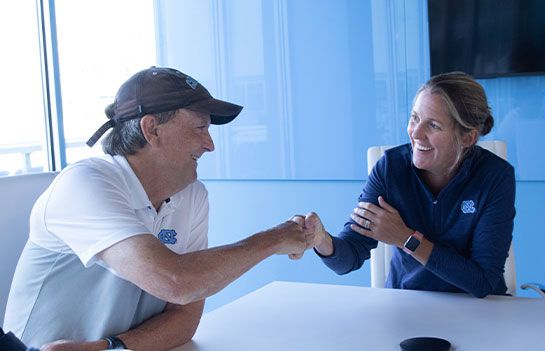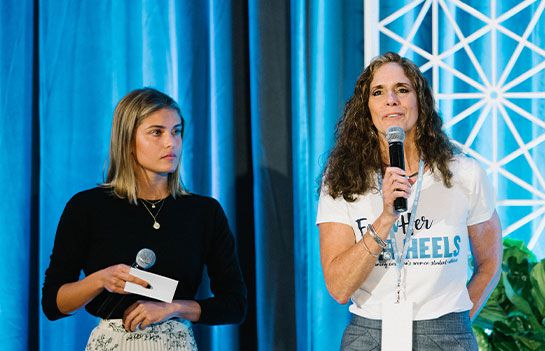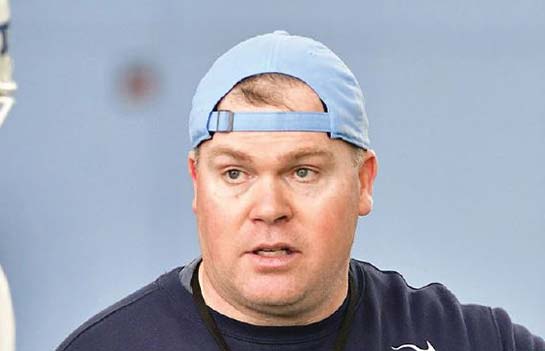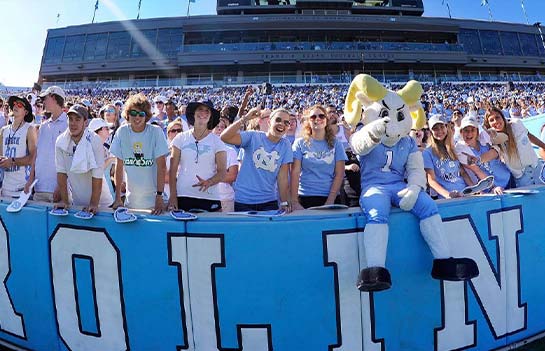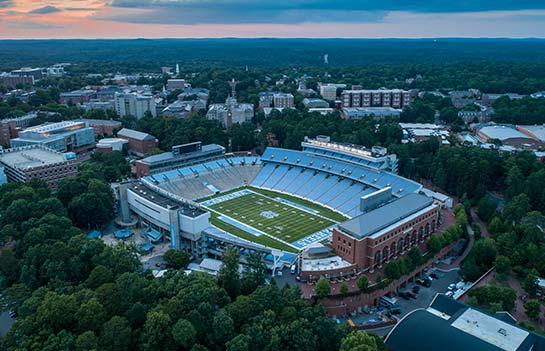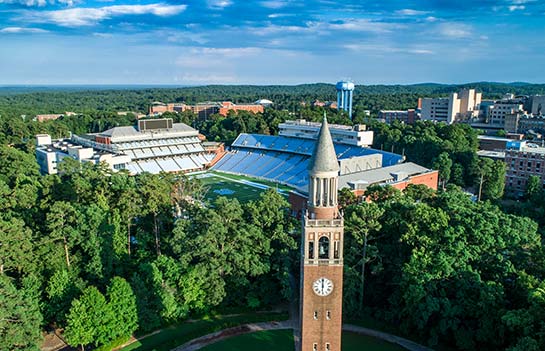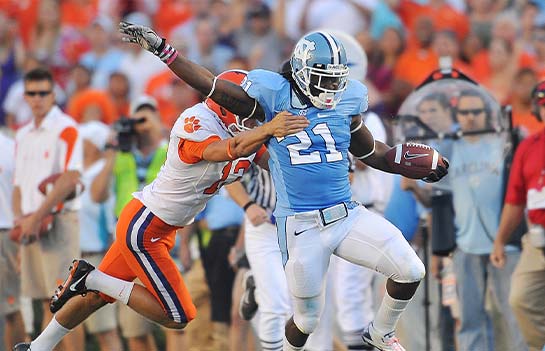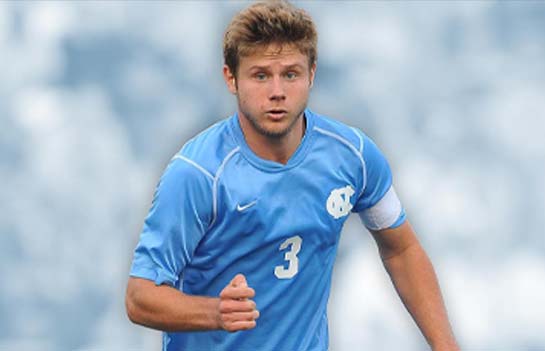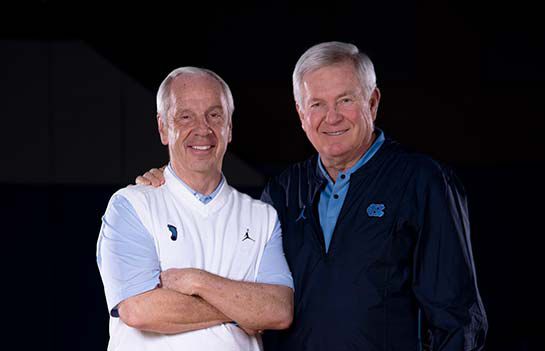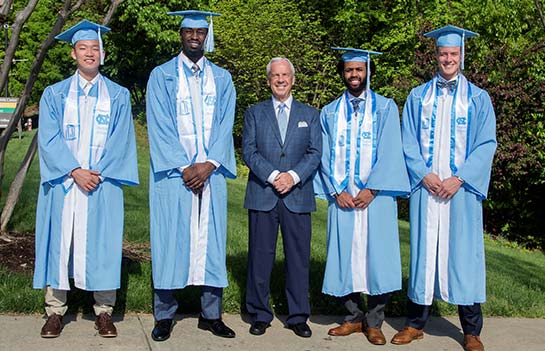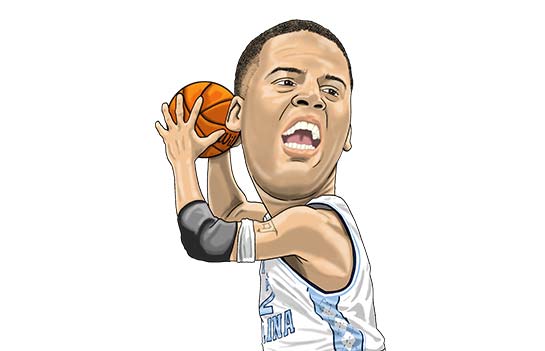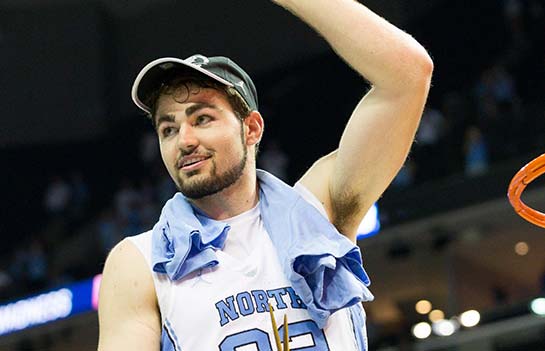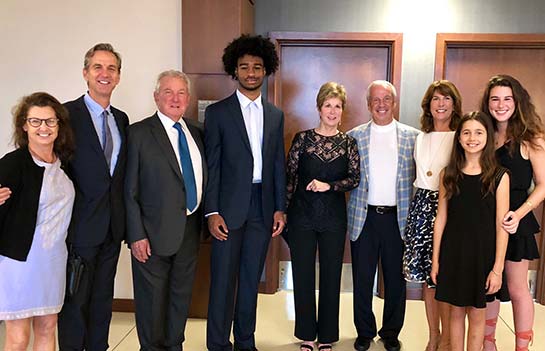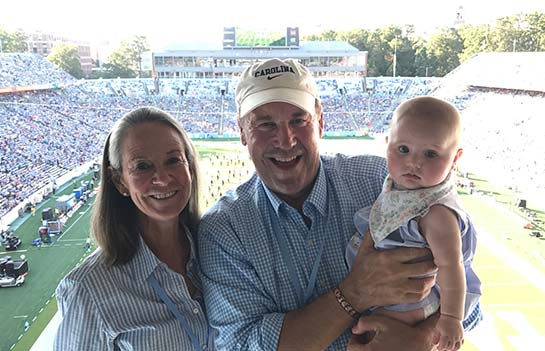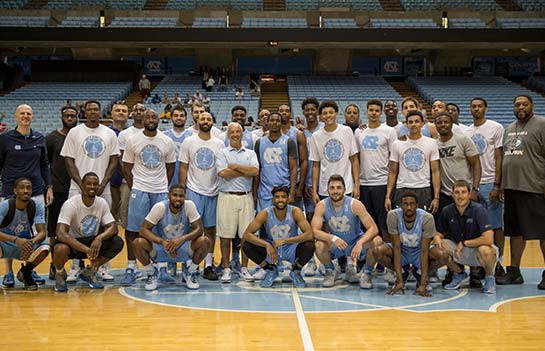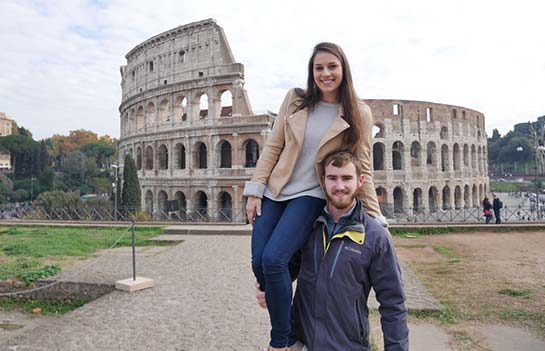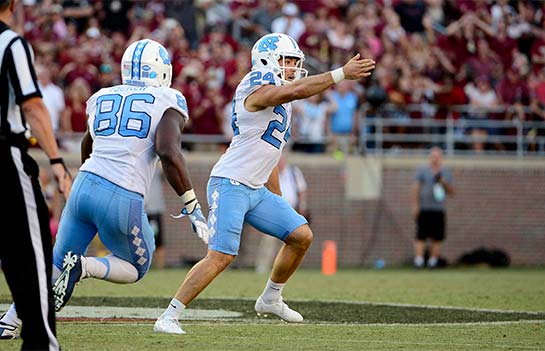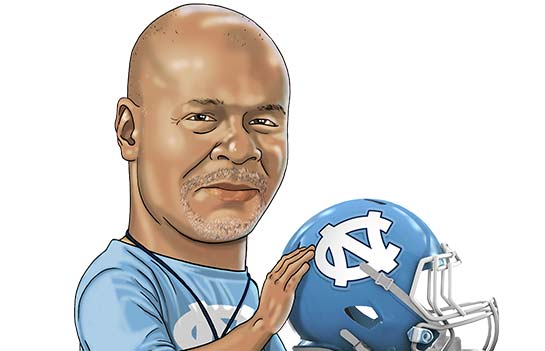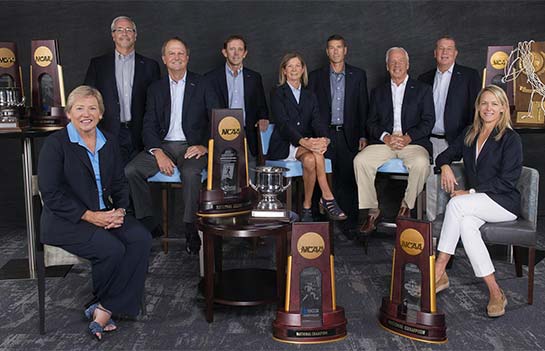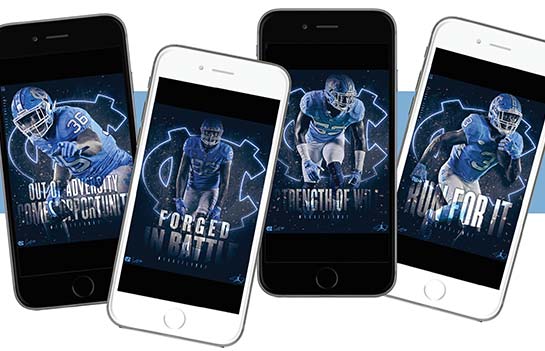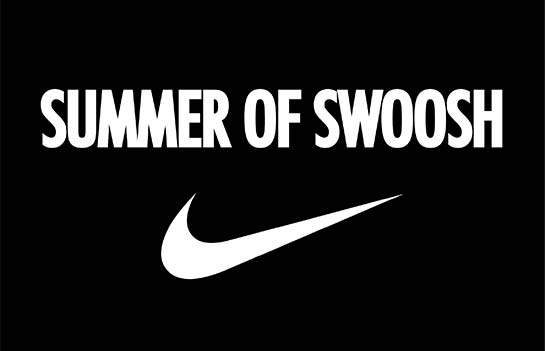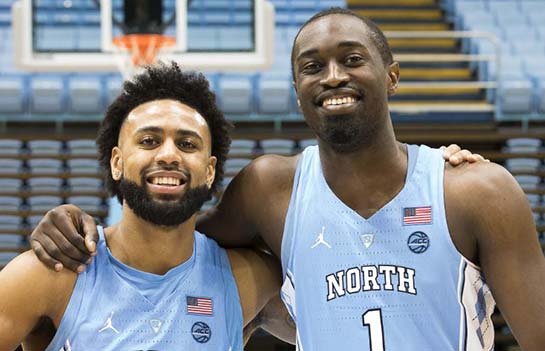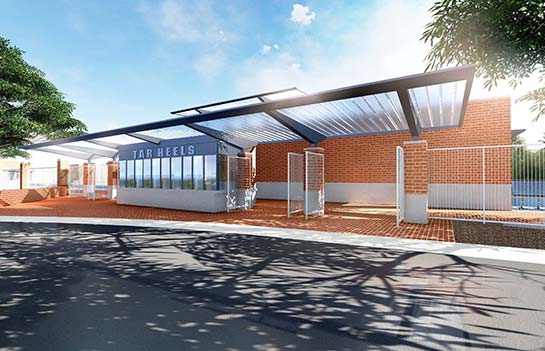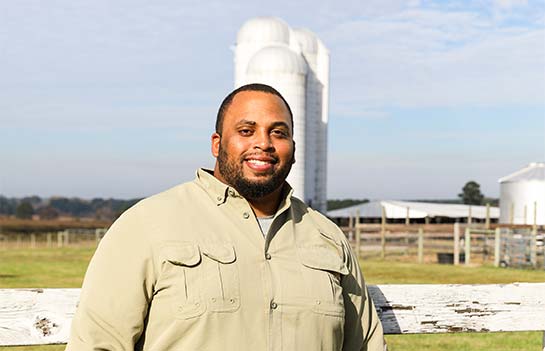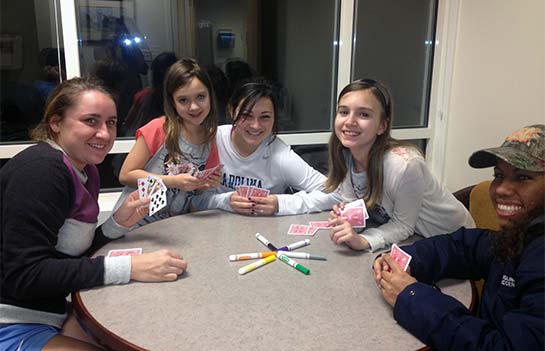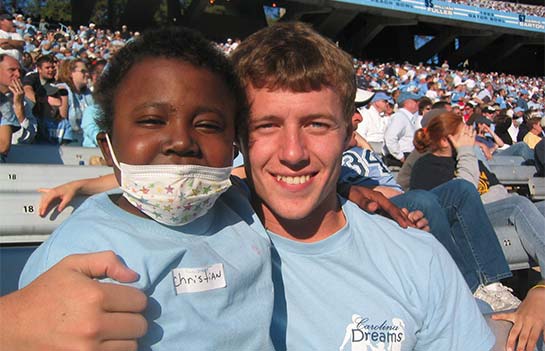Servant Heart
Family and friends have come together to honor priceless gem James Spurling by naming the West Concourse in his honor. If you would like to contribute to this honor, please click here, or contact The Rams Club at 919-843-2000 or ramsclub@ramsclub.com.
By: Lee Pace
Oct. 15, 2021

Today on one perimeter edge of Eastgate Shopping Center in Chapel Hill there are separate restaurants serving burritos, gourmet salads and souvlakia, but up until a decade ago there was a full-service gas station there called Eastgate BP.
"Like the song says, 'They paved paradise and put up a parking lot," says Shawn Hocker, a former Tar Heel football player who toiled during the summers pumping gas, scraping windows and doing odd jobs around the business owned and operated by one James Israel Spurling.
Before the internet, social media and text messaging, news spread by chewing the fat. At Eastgate BP most every morning, various and sundry from town and gown would convene to drink coffee and commiserate about politics, the weather and Tar Heel sports. Among the regulars over the years were UNC Chancellor Bill Aycock, Rams Club Executive Director Ernie Williamson and Kenan-Flagler Business School Dean Paul Rizzo.
"Mr. Spurling's station was the centerpiece of town," says Hampton Corley, who grew up in Chapel Hill and whose father, Glenn, was a prominent architect. "Men met there and talked about town business. He kept tabs for gas sales and people settled up at the end of the month."
"It was a 'Who's who' of university and town leaders who'd come through every day," says Jeff Saturday, another football player in the fall and gas-jockey in the summer. "It was a home-away-from-home for a ton of folks. James always had a smile on his face and was there to listen. It was like the town barbershop. The news traveled first through Eastgate BP."
Mack Brown was hired in 1987 as the Tar Heel football coach and was immediately given Spurling's name as a man to know in town.
"You come to a new place and you need a doctor, you need a lawyer, you need a place to get your car fixed and get gas," Brown says. "Everyone said, 'James is your guy.' From that point forward, he's been a best friend. Back then, players could get part-time jobs. He hired a couple of our guys every year. But James would say, 'Don't send me anyone who won't work. I'll fire him if you do.'"
It was over more than two decades at Eastgate BP that Spurling's amiable personality, servant heart and soft Granville County drawl endured him to legions of locals and those who popped into town from time to time, among them prominent university benefactors like Maurice Koury and Charlie Loudermilk. Hocker, now a prominent orthopedic surgeon in Wilmington, and Saturday, a former NFL All-Pro center, were among the players who sweated their summers away.
"I had a summer job, but it was not so much a job as it was a course in developing relationships," Hocker says. "James' place was the cultural hub of the town. When I left, I realized I'd learned from the master. Those years helped cement who I am."
When Hocker was rejected when he first applied to medical school, Spurling was there with a rub on the shoulder and uplifting word. When Saturday went undrafted by the NFL out of college before later catching on as a free agent, Spurling was there to sooth his emotions and promise him things would turn out. James was right on both counts.
"In my darkest hour, James was there for me. Few people in my life have made an impact like James has," Saturday says.

James Spurling grew up in Granville County and as a teenager in the late 1970s worked construction for his father and got extra hours pumping gas and doing odd jobs at a service station on Airport Road. Ernie Williamson, a former Tar Heel football player and at the time the first executive director of The Rams Club, stopped in one day and said he had a flat tire on his tractor at home and asked if he could borrow an air tank.
"Maybe you should go ask where you buy your gas," the owner snipped back at him.
Spurling was embarrassed that a customer had been treated rudely and, as an avid Carolina fan, was also a little awed that the man in front of him had played football not only for the Tar Heels but the Washington Redskins in the NFL. He struck up a conversation with Williamson and offered to visit Williamson's home that evening and help him repair his tractor. That accomplished, Williamson offered to pay Spurling, but he refused.
"Son, you ever been to a Carolina football game?" Williamson asked.
"No, sir, but I'd love to," Spurling answered. "My eyes got big as half dollars when he said he'd take me to a game."
And so began a long-standing relationship between Spurling and Tar Heel athletics—the football program in particular—that lasts today.
Spurling as a young man worked a year as a police officer in Creedmoor and then took a full-time job at Eastgate BP. He had a chance to buy the station in 1982 and remembers to this day his exact monthly payment on the loan: "It was $3,508 a month. I was scared to death. But I paid that 20-year note off in seventeen years."
Every coach on the football staff in the 1980s onward was a regular customer, and Spurling's Christmas gift from Mack and his wife, Sally, when they left for Texas in December 1997 was an envelope of roundtrip airplane tickets for him to visit Austin. Spurling was on the sidelines for the 1998 Texas-Oklahoma game, the Cotton Bowl that year and also for the 2006 Rose Bowl when Texas beat USC for the national championship. He was ready with a bear hug when Brown rejoined the Carolina staff in November 2018.
"Those Texas people treated me like I was the President," Spurling says. "When Vince Young scored to win the ball game, there's no way Mack was any happier than I was. Now that he's come back, I'd like to see that same thing for the Tar Heels."
Spurling sold the station in 2005 and was looking for something to do. John Bunting, the Carolina head coach at the time, told him there was a part-time receptionist job opening at Kenan Football Center. Spurling applied and was hired. Soon after, stadium director Richie Grimsley left for a promotion at UNC-Wilmington, and Spurling thought that the building maintenance aspects of the job and overall organizational demands weren't wholly different from what he'd done running a business. He applied for the job.
Dick Baddour, the athletic director at the time, remembers Spurling going through the standard interview process and the Athletic Department sending his application to the UNC Office of Human Resources with the recommendation he be hired.
"H.R. didn't want to approve it because they didn't think he had enough experience and training," Baddour says. "They said while he had owned and operated a service station, and, by the way, the most popular one in town, he did not have the qualifications. So we had our H.R. person sit down with him and completely understand the skills and abilities needed to run a first-class service station. Turns out those traits were directly in line with our job. We wrote it up with a strong recommendation to hire, and they went along with us.
"I wrote a note on the recommendation to hire saying he will, without question, be one of the most outstanding hires in the department. That proved to be true. And he has pleased five head football coaches, which may be his grandest achievement."

A hundred or so friends of James Spurling gathered late Thursday afternoon just outside the northwest Gate 3 of Kenan Stadium. Spurling had been in a carefully choreographed meeting for an hour, and Brown told him that he and Sally had an idea for the concourse they needed to discuss with him. He was stunned to walk into the gathering and see mockups of the signage to be installed the next day christening the portion of the stadium that runs above the first two floors and beneath the top two floors of Kenan Football Center as the James Spurling West Concourse.
"I can't believe we did this in your stadium and you did not have a clue," Brown kidded Spurling. "How did you let that slip by?"
Spurling's title is "Director of Kenan Stadium," and in that role he's responsible for the maintenance and upkeep of the Kenan Football Center and stadium and managing construction and renovation projects. Every supplier and contractor comes through Spurling. He unlocks the gates at dawn from a jangly key ring that has numbered as many as 72 keys and constantly patrols for wayward trash. It can be a seven-day-a-week job at times. He's helped Tar Heel fans stage marriage proposals and watched others as they've spread loved ones' ashes on the playing field. Often he's gone beyond the call of duty. In Maurice Koury's declining years, Spurling routinely picked him up in a golf cart from his parking spot before football games and drove him to the elevator entry into the north side premium seating facility that bore the names of John Pope and Koury himself.
And he's always got time for a story and to ask about a visitor's family. He's liable to encounter a man and his wife or girlfriend and say, "Where's the seeing-eye dog? This gal wouldn't be with you if her eyesight was any good."
"I've loved every minute I've been here," Spurling says. "This is a special place. The people who generated the history of this program and the history of this stadium are still here in spirit. I think my friends like Ernie and Maurice are looking down and saying, 'Man, that stadium is as pretty as it ever was.' What I care about is having people come in here and say, 'James, this place looks great.' That's the neatest thing."
His work has been lauded with various awards such as the 2009 Ernie Williamson Award, given to an Athletic Department employee for outstanding service, and the 2015 C. Knox Massey Distinguished Service Award, one of the most coveted distinctions earned by faculty and staff on the Chapel Hill campus as a whole. Paul Rizzo, known by Spurling as "Pappa Rizzo," and his wife Sydna endowed a full football scholarship in Spurling's name.
But nothing's ever matched having his name on the facility.
"What you have done for this place will never go away, and now your legacy will live forever," Brown said. "We love you, we appreciate you. I'm glad that for many, many years people will know the story and the person, James Spurling."
"Nobody deserves it more," adds Athletic Director Bubba Cunningham. "What you have done for this place and the University is unbelievable. It's been said that you cannot live a perfect day until you do something for someone who cannot help you in return. James does that every day for hundreds of people. This is an opportunity to celebrate what he has meant to Carolina, and, specifically, to Carolina football."
The idea for naming the concourse in Spurling's honor came from Rams Club officials, who quietly raised the funds from several dozen individuals and families—including former Tar Heel football and basketball players, at least one former University chancellor, a former head football coach and others whose lives have been touched and enriched by Spurling. When others outside that sphere heard of the campaign, waged with utter secrecy so that Spurling was never the wiser, they volunteered to pitch in as well, the funds earmarked for various Kenan Stadium facility improvements and to retire debt.
The Ohio-based institutional design firm, Forty-Nine Degrees, offered the design, materials and labor at no charge in homage to Spurling, their point person through the renovation work they did in Kenan Football Center over the last 18 months.
"We work with schools all over the country and work with a lot of great people. But there was something about James that resonated with us right from the first meeting we had," says Forty Nine Degrees Vice President Brad Hart. "His love of North Carolina, his love of Mack Brown, his love of Kenan Stadium. That's his baby, right? Anything we asked for, he took care of, no questions."
Hocker in his salute to Spurling Thursday afternoon reminisced about his days at Eastgate BP, about Spurling's insistence on how they should answer the phone to keeping a close eye on the boys' Moon Pie consumption.
"I couldn't be prouder to see James parlay that into a larger arena with the football program," he said, then mentioned Brown's coming back to Chapel Hill and having eight former players from the 1990s in some degree of assistant coaching or administrative support role. Then he nodded toward Spurling.
"Some of that glue that brings us together is this man in front of us."
More Stories
The impact of giving comes through in wonderful stories about Carolina student-athletes and coaches, as well as the donors who make their opportunities possible. Learn more about the life-changing impact you can have on a fellow Tar Heel through one of the features included here:
